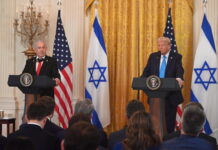The Chilcot report was all about the processes, not the ideology or values which justified the Iraq war, writes Abdul Wahid.
In 2003, Britain’s political class believed that Saddam Hussein, uniquely amongst Middle East despots, was an enemy who deserved removal. “Regime change” for a government with whom they had once trade in oil and arms, and over whose mass murder they had remained silent.
Muammar Gaddafi, Hosni Mubarak and others were to remain allies – deserving of a hug and even a holiday with Tony Blair – until British interests changed to support one section of Gaddafi’s opponents at the time of the Arab Spring. In Egypt, however, Sisi was supported over Morsi – despite the latter being democratically elected.
Confused by the inconsistency? We shouldn’t be. Lord Palmerston, Britain’s Foreign Secretary in the 1840s, once famously said that, “We have no eternal allies, and we have no perpetual enemies. Our interests are eternal and perpetual, and those interests it is our duty to follow” – the doctrine Britain has practiced for at least 200 years.
The aim isn’t about establishing decent values in the world. Occasionally it might be to make Britain safer e.g. against Nazi Germany – but mostly, it’s to make a section of Britain’s elite richer.
Chilcot Report
Sir John Chilcot’s remit was not to explore the fundamentals of British foreign policy. It was confined to exploring the processes surrounding the Iraq war, and concluded in devastating detail the failure to question the intelligence that falsely alleged Saddam had WMD’s; the failure of cabinet discussion; the failure to exhaust diplomatic options prior to going to war; the failure for the military high command to raise concerns when the war policy was going wrong; the failure to plan for the aftermath, despite adequate warnings about the possible consequences etc.
Subscribe to our newsletter and stay updated on the latest news and updates from around the Muslim world!
 Britain’s political class is shamed by these failures of process. But there is very little disagreement about the Britain’s foreign policies, particularly towards the Muslim world.
Britain’s political class is shamed by these failures of process. But there is very little disagreement about the Britain’s foreign policies, particularly towards the Muslim world.
Alliances with the House of Saud and other Gulf regimes, the Assad family, Mubarak, Gaddafi, Karimov in Uzbekistan – have all been about maintaining British influence, so as to make “the few” richer.
Similarly, war against Saddam followed Palmerstone’s doctrine in that it was never about his crimes against his people, nor to make Britain safer, but part of a wider strategy to maintain Britain’ influence in a changing world.
Some say Blair looked “haunted” in his response to Chilcot. Others say he looked deluded. But to me it was neither. It was an explanation that the underlying policy of which this failed war was but one part – to use diplomatic and military force to secure British interests thousands of miles away – was fundamentally sound.
He argued, as he has done consistently, that 9/11 showed that “Islamist extremism” was a regional and global threat. Saddam’s Iraq – like most of the other regimes – was unsustainable in the long run and the risk of an overthrow by those “Islamist extremists” was real. The Arab Spring, he said, showed that Western intervention was necessary before events ran their own course.
Preventing real change
I do not think Blair, Bush, Cameron, Gove and others believe their own lies – that a real Islamic change in the Muslim world would be any immediate security threat to Britain or Europe.
But what they do know is that an independently minded government anywhere in the Muslim world, which decided not to play by the rules of capitalism and its current world order, would fundamentally threaten British influence and corporate interests – and that their aforementioned support for wars and odious regimes, and the lies about Islam, are all justified because of this.
 Far from being a threat to peoples’ lives across the world, an Islamic government on the principles of the Prophetic model would voice a different set of values on the world stage, putting human dignity above material benefits for colonial powers.
Far from being a threat to peoples’ lives across the world, an Islamic government on the principles of the Prophetic model would voice a different set of values on the world stage, putting human dignity above material benefits for colonial powers.
It would question a world that is dominated by values that produce today’s global policies – where making peoples’ lives are more secure or more dignified are never the aim, just an occasionally be a “welcome” side effect.
It would not simply question wars, but the policies that keep millions enslaved in poverty.
It would not allow virtual slave labour (as in Qatar) or global health hazards (such as Zika) to justify entertainment spectacles like the World Cup or Olympics, whose primary aim is to make their sponsors richer.
Chilcot may have fulfilled his remit. But that shouldn’t stop people looking at the dark values that do not just underpin the Iraq war. Whether “Blairite” warmongering or the use of “soft power” (i.e. diplomacy, trade, overseas aid, education programs etc), the long term aim of Britain foreign policy is rarely questioned or challenged.
Its role to interfere in other countries – sometimes destabilising elected politicians, sometimes stabilising unelected dictators – is all too often either unknown, ignored or accepted.
Abdul Wahid is a regular contributor to New Civilisation. He is currently the Chairman of the UK-Executive Committee of Hizb ut-Tahrir in Britain. He has been published in The Times Higher Educational Supplement and on the websites of Foreign Affairs, Open Democracy, and the Prospect Magazine.
@AbdulWahidHT






















